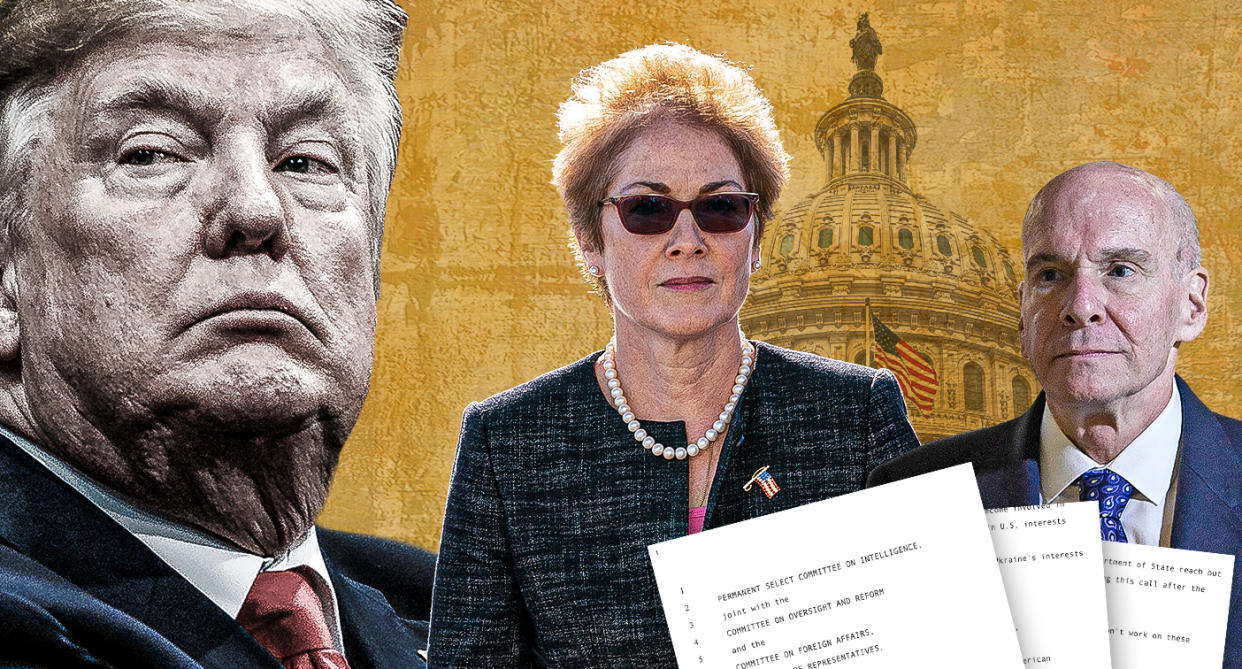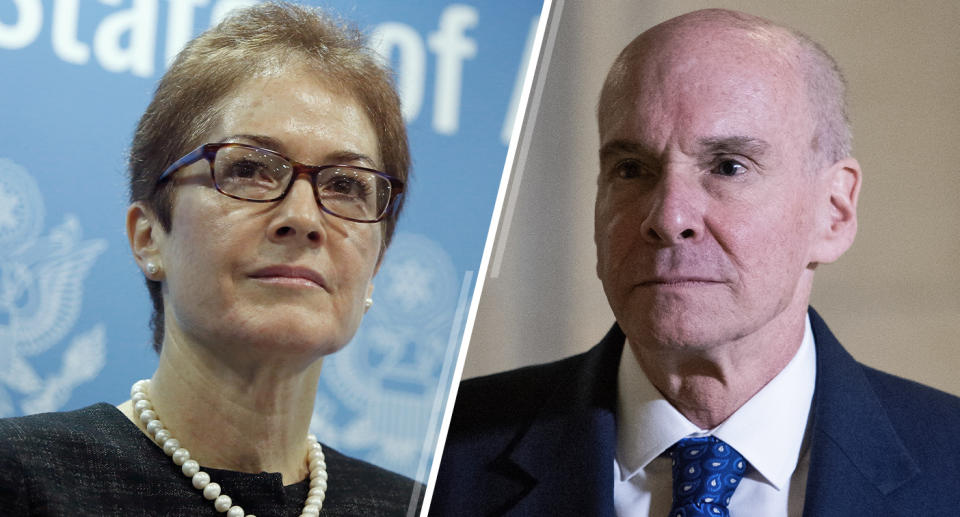Release of House transcripts darkens prospects for Trump

- Oops!Something went wrong.Please try again later.
WASHINGTON — The impeachment inquiry against President Trump entered a new phase on Monday with the public release of transcripts of House committee interviews with Marie Yovanovitch, the former U.S. ambassador to Ukraine, and Michael McKinley, a former top adviser to Secretary of State Mike Pompeo.
Those deposition transcripts, House Democrats say, show apparent efforts to undermine U.S. foreign policy to serve the president’s political goals. Those efforts apparently became so intense that Yovanovitch acknowledged that she felt threatened by Trump and his interference in her work.
“I was shocked,” she told investigators.
Trump stands accused of exerting undue pressure on Ukrainian President Volodymyr Zelensky to launch an investigation into former Vice President Joe Biden and his son Hunter. The younger Biden sat on the board of Burisma Holdings, a Ukrainian energy company accused of corruption. Joe Biden is a frontrunner for the Democratic nomination for president.
Since the impeachment inquiry began several weeks ago, Republicans have complained about the allegedly secretive nature of the witness interviews. The release on Monday of the two transcripts appeared designed to undercut those complaints. House Speaker Nancy Pelosi has said that public hearings would begin soon.
“With each new interview, we learn more about the President’s attempt to manipulate the levers of power to his personal political benefit,” House Democrats said in a statement accompanying the release of testimony. The statement also accused Trump of leveling “public falsehoods and smears” against Yovanovitch, who was recalled by the president in May and who now teaches at Georgetown University.
The respective testimonies of Yovanovitch and McKinley largely corroborate what former special Ukraine envoy Kurt Volker and Bill Taylor, the current U.S. chargé d'affaires in Kiev, have told investigators: that Trump’s personal lawyer Rudolph Giuliani pushed for Ukrainian officials to open a new investigation into Hunter Biden; that Trump reinforced that message in a July 25 phone call with Zelensky, which seemed to tie nearly $400 million in U.S. military and other aid to a Biden investigation; and that Yovanovitch was dismissed because she was seen as an obstruction to the work being done by Giuliani and his associates.
In particular, the testimony of the two key witnesses strongly suggests that Pompeo, a close ally of Trump with political ambitions of his own, refused to back Yovanovitch, implicitly giving credence to Giuliani’s efforts to pressure Yuri Lutsenko, the Ukrainian prosecutor general, to turn his attention to the Bidens.
Yovanovitch, who was appointed to the ambassadorship by President Barack Obama, was not among those who pushed for such an investigation. And by the spring of 2019, she had lost confidence in Lutsenko’s ability to deal with corruption in general. (He was replaced as Ukraine’s prosecutor general after Zelensky came into office and is now himself the subject of a criminal investigation.)
In his testimony, McKinley said he was disgusted by the way the State Department had become subordinated to Trump’s personal political ambitions. “In 37 years in the Foreign Service and different parts of the globe and working on many controversial issues, working 10 years back in Washington, I had never seen that,” he said.
McKinley resigned last month.

Giuliani did not respond to questions about the release of the testimony. White House press secretary Stephanie Grisham also declined to comment.
For her part, Yovanovitch described how she, a career diplomat, suddenly found herself the target of political attacks because the president and his allies saw her as impeding a Biden-related investigation. Under questioning from Democrats and Republicans alike, she repeatedly denied harboring any interests outside those of well-established United States foreign policy goals, in particular relating to those of containing Russia in Eastern Europe. The military aid to Ukraine was meant to hinder precisely those ambitions of the Kremlin.
At times, she seemed overcome by the scope of the scandal in which she is now a central character. “I couldn’t imagine all of the things that have happened over the last six or seven months,” Yovanovitch said at one point. “I just couldn’t imagine it.”
Yovanovitch’s troubles began with an article in the Hill by John Solomon, a formerly reputable journalist who has become an ardent Trump supporter. In an article published in March that was based on an interview with Lutsenko, Solomon said the Ukrainian prosecutor general alleged that Yovanovitch — whom he did not name — “gave him a list of defendants that he would not be allowed to pursue,” the Bidens presumably among them.
Yovanovitch quickly became a target for pro-Trump figures, including the president’s son Donald Jr., and was dismissed from her ambassadorship in May. Also around that time, Giuliani was earnestly conducting his own campaign to have Lutsenko open a new investigation into Hunter Biden.
In her testimony, Yovanovitch said it was “completely false” that she had ever created or given Ukrainian officials the kind of list Solomon described in his article. She said it was “equally fictitious” that she was “disloyal” to Trump, a seeming reference to the “deep state” fears frequently voiced by the president and his supporters.
In his call with Zelensky, Trump said that Yovanovitch was “going to go through some things,” an ominous suggestion upon which the president did not elaborate.
Asked by investigators if she felt threatened by those words, Yovanovitch answered in the affirmative.
In their questioning of Yovanovitch, Republicans seized on the fact that Zelensky agreed with Trump’s negative assessment of her. The implication was that if even the new reformist in Kiev disliked her, then something really was amiss at the U.S. Embassy there.
Yovanovitch never received an adequate explanation of why she was dismissed. A high-ranking deputy in the State Department told her that “the president had lost confidence in me,” as she put it to investigators, “and no longer wished to see me.” As for the State Department, it declined to release a statement praising Yovanovitch, fearing it would be “undermined” by Trump, as Yovanovitch put it to the congressional panel that interviewed her last month.
Although aspects of Yovanovitch’s testimony were previously known, the full transcript of her interview, running longer than 300 pages, offers details that are bound to harden Democrats’ convictions that Trump acted improperly in his discussions and actions relating to Ukraine. Trump and his allies have maintained he was conducting foreign policy in keeping with previous administrations.
There were also many colorful details, as when Yovanovitch described how Pompeo had reportedly called Fox News host Sean Hannity — a close adviser of the president with a fondness for conspiracy theories — to find out if the allegations about her were true.
At another point, Gordon Sondland, the U.S. ambassador to the European Union, a top Republican donor who was seen as endorsing Trump’s political efforts in Ukraine, suggested that she send tweets supportive of the president. She declined to take that advice.
After she was recalled to the United States, no one from the State Department contacted her until McKinley offered his own private statement of support.
“I was flying solo,” he explained. “I didn’t know what the rules of engagement were. But I did know that, as a Foreign Service officer, I would be feeling pretty alone at this point. And so I reached out.”
Guide to the Trump impeachment inquiry: The key players
Click on the key figures below for more details.
_____
Download the Yahoo News app to customize your experience.
Read more from Yahoo News:



